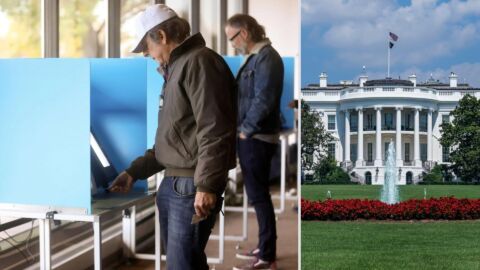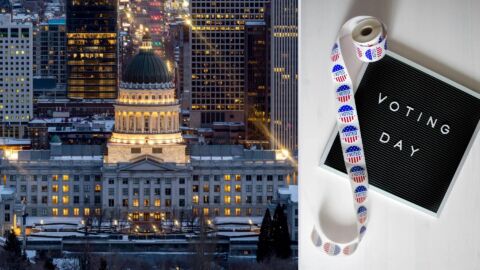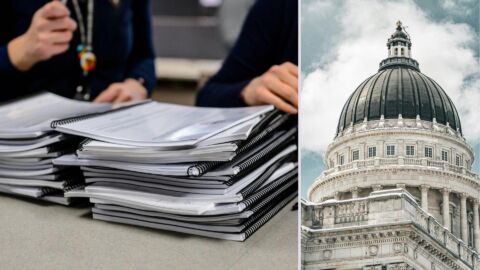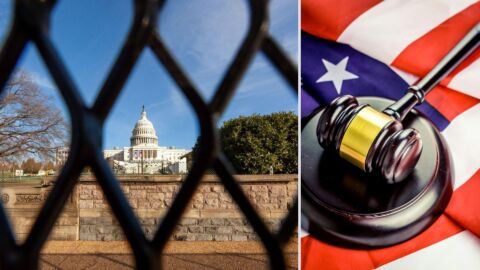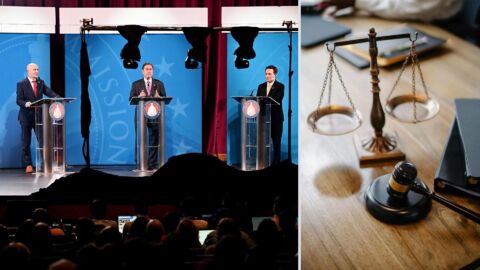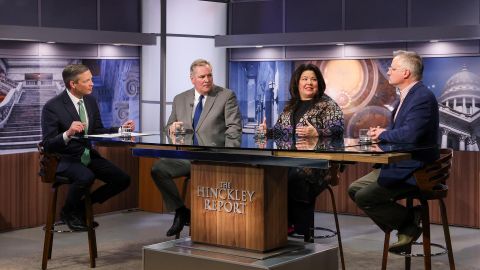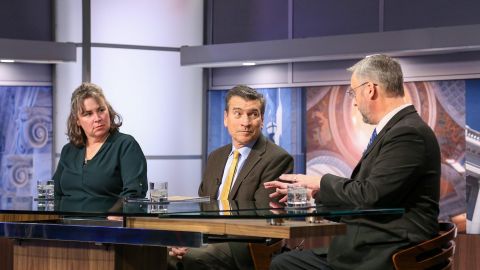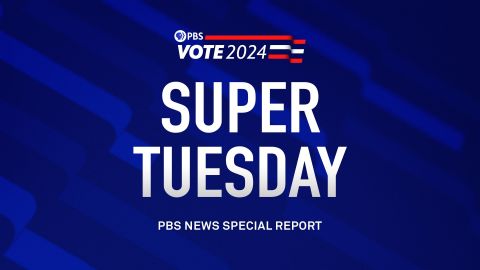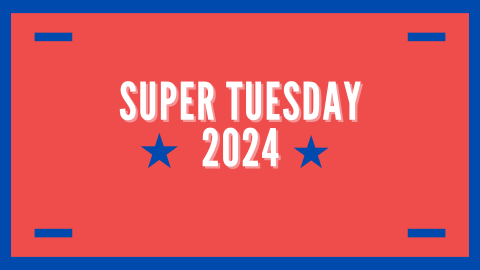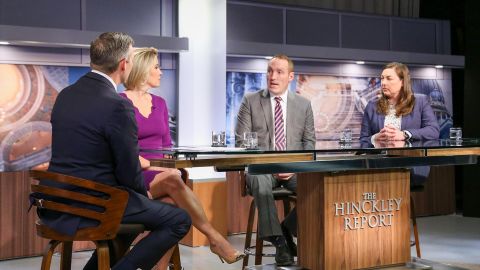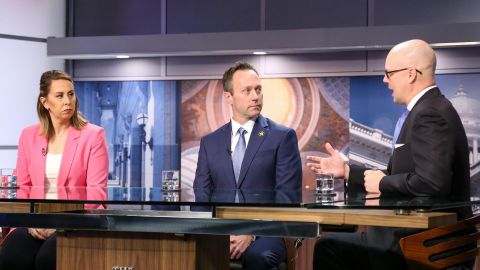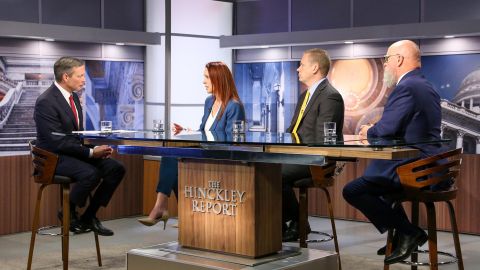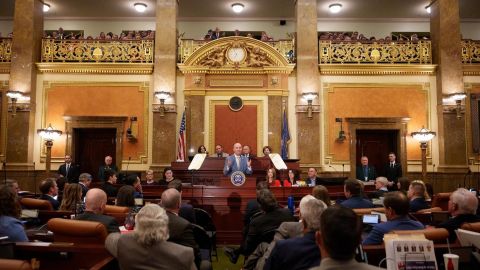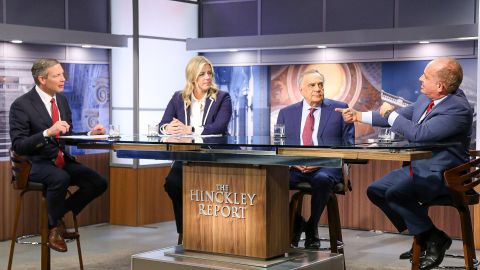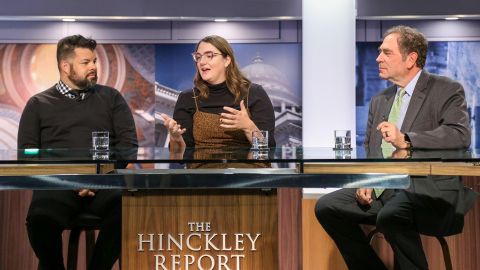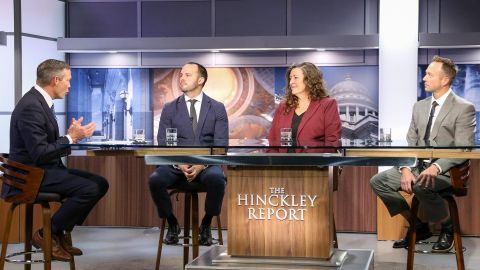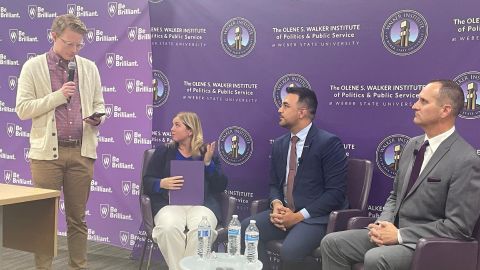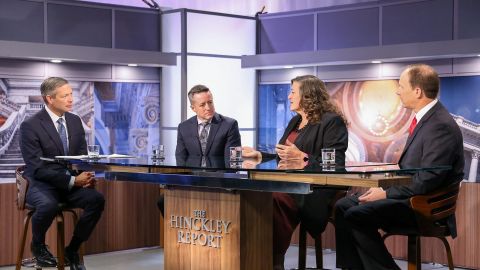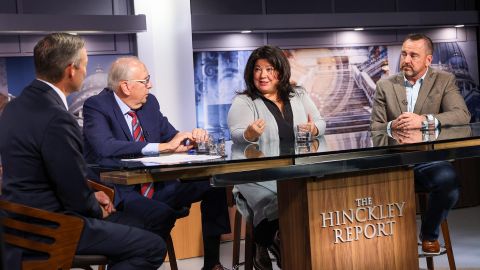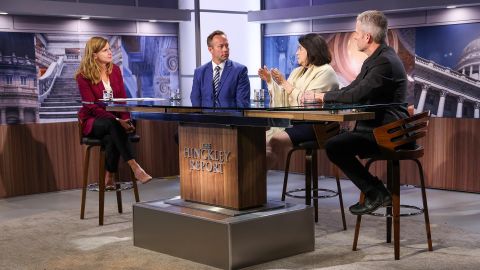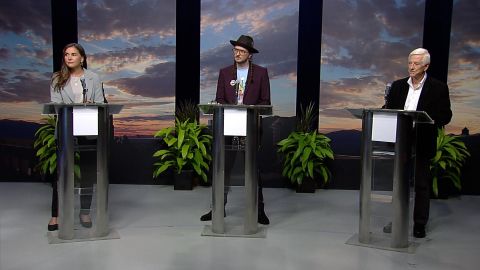(gentle music) - [Announcer] Funding for "The Hinckley Report" is made possible in part by the Cleone Peterson Eccles Endowment Fund.
- Tonight on "The Hinckley Report," our panelists reflect on another historic year in politics.
What were the major stories that captivated our state?
How have national events shaped Utah's political landscape?
And what are voters' priorities in the year ahead?
(bright upbeat music) Good evening, and welcome to "The Hinckley Report."
I'm Jason Perry, director of the Hinckley Institute of Politics.
Covering the year we have Maura Carabello, president of the Exoro Group.
Leah Murray, director of the Walker Institute of Politics and public service at Weber State University.
And Max Roth, anchor with Fox 13 News.
We're so glad you're here with us as we talk about the year, the year that was, and the year that is coming and there has been so much in politics.
As we understand, politics is part of everything.
But there are big issues in the state of Utah that are connected to it and the three of you're gonna talk about it today.
Let's start with it this way because I want to get to some of these topics, but why don't I say to each one of you, all right, Maura, let's start with you.
A big story of the year that you have been following that we've covered here and that we're gonna see going forward.
- Ooh, a big story I'm going to point out is one that's more of a theme, not an individual story.
And it's, we had a huge focus on sports this year.
The Salt Lake Bees moved to South Jordan, which is a hub now, little South Valley of the Wasatch front.
But we have then conversations about Major League Baseball.
We have conversations about national hockey.
And of course, we're all following the Olympics.
Politics are involved in sports.
Your reputation, your brand, the amount of public money that's invested often in public stadiums.
So I'm gonna say sports, big league sports, as a theme was a big deal this year and I think we should start watching for more conversations from public officials about public financing and about the impact that this will have on our image and our brand, what it means to our lifestyle choices.
I think big league sports was a story as a theme that may end up making a big imprint.
- Wow, well, Leah, that's totally true.
And I'm gonna put in this category.
Politics is the ultimate sport.
But it's completely tied to these big events, these expansions.
Legislative leaders are talking about it, business leaders are talking about it.
And as you look to the growth of the state of Utah, this certainly has to be part of the discussion.
- Yeah, no, I think so.
And I was thinking when you just said what you said, Maura, I moved here in 2002, so right on the heels of the Olympics being here last time, and when I arrived from New York where we didn't have rules around drinking that were quite as strict as they can be here in Utah.
- We have strict rules here?
- Not as much.
So my point is, when the Olympics came in, all the conversation when I arrived that summer was, "Everything's a little different now."
Because the Olympics were here, we had to adjust to a global- - Mm-hmm.
- Does that make sense?
Customer service base.
- New group of people.
- A whole new group of people.
And so to a certain extent, when you start leveling up your sports franchises, you become a little more global, right?
You're a little more, you're appealing to different kinds of people, and the rules are gonna look a little more like what people expect other places.
- Which are political discussions, right?
- Oh, absolutely.
- Although I think they're, I think in some ways, now, I don't think this conversation is a distraction, but I think for politicians, I think it is a nice distraction to talk about Major League Baseball instead of talking about some of the intractable issues going on in the world.
And so to go up and to stand with Gail Miller, who everyone loves, and to say, "I love baseball, and wouldn't we be a great baseball town?"
That's an easy speech to give.
It's fun for people to think about and it takes conversation away from other things.
- Except that, can we just, I'm so sorry.
Except that Senator Mike Lee, right on the heels of the Gail Miller announcement, tweets that really what we should do is get rid of the special status national baseball has as an exempt, right.
- The antitrust, yeah.
- So sometimes it's not as easy, right, you know what I mean?
You can even fumble.
- Right.
- Using a reference from football, but.
- And Senator Mike Lee has never been known for making things easy.
(group laughs) That's not his MO.
- It's interesting when you talk about the perspective of elected officials to this great point, Maura, is the world starts looking at us, 'cause you talk about the Olympics, that's the world.
Presidential debates, baseball.
What kind of impact does those potential views of the world have on policy for our elected officials?
- I mean, I think that they should and will, because those questions from the world, those questions from participants who are looking for a place to participate, are a lot of the social fabric and a lot of the social contracts and the social discussions in America and in Utah right now are really strained.
They're very hard.
They're the same issues that many franchises, how welcoming are we, what are our positions about different kinds of participants and accepting things?
The Olympics is sort of based on a notion of inclusion and based on a notion of diversity.
And so as we grapple through, I mean we're in the final stages.
Everyone believes, I think this last announcement in December of this year made us all very sanguine about getting the Olympics.
But now the cues are who are you and how do you welcome us in?
That's always a really big Olympic theme.
- Yeah, absolutely right.
Leah, let's talk about a big story you've been following.
- Yeah, so my favorite political story of the year is what I feel is the rural county flex that we saw on display in the special election primary.
And then, I mean, I guess through the election for Congressional District Two.
So, it's something that political science doesn't study a lot, right?
There's not a lot of literature around rural politics.
We kind of ignore fly over states and rural areas, or we have preconceived notions about those people.
And a lot of times I think we think they're just Republicans, right?
So you kinda talk about them in the terms of what it means to be a Republican.
And what was fun about that special election is it was Republicans.
So you're holding constant that party, and the rural counties showed up and owned the day, right?
So I am very interested a lot in how, coming from New York, and I was an upstater, there was a very big dynamic in New York state between upstate and New York City.
And I heard a little bit of an upstate downstate dynamic in that special election conversation.
And I'm really just kind of interested, does that make sense, in how politically Utah looks in these conversations going forward.
Has the south arrived or something, right?
You know, those counties?
- Yeah, it's also an interesting note on how we've rearranged our congressional districts.
Our philosophy was to have them be as statewide as possible for most of them, right?
So this statewide nature makes you have a little rural-urban tension, even when you're in a singular party like the Republicans had this last year.
It'll be interesting.
They were heavily advantaged by a special election in which rural overperformed, over came out to vote.
- They showed up, right?
- They totally did.
- Right, right.
- Presidential elections tend to be higher performers for everybody because we all have such a high awareness of a presidential election.
But can they hold their own?
- And I do wanna push back a little bit on the rural-urban idea.
While you're absolutely right, and I think with this election, those votes that, the dramatic performance of Celeste Maloy in rural areas actually did put her over the top among the Republican primary electorate.
At the same time, Utah is the seventh most urban state in the country.
Utah's not a rural state compared to most other states because even though we think of Utah as a state that has beautiful topography, so many of us love being here because of the outdoors, and we think of those vast empty spaces, they're empty spaces because it's inhospitable.
And so Utahans tend to not live in, like our small towns are very small.
And the vast majority of Utahans live in populated, metropolitan, micropolitan areas.
We are not a rural state, about 10% rural.
- You're absolutely right.
But the people who live in those rural areas, I think demonstrated a rural consciousness that we haven't seen, or at least I haven't seen.
Does that make sense?
Or maybe it was behind closed doors and, right, it just kind of blew out on the stage.
- There's a certain way that she owned that vote, that Celeste Maloy owned it.
She claims her history in Beaver County and lives in Iron County, and yeah.
- And what I hear that's interesting about this is, Max, I think, that I've often pointed that out, but we still view ourselves, Washington County would tell you that they're rural, I dare say Utah County will tell you they're rural, when they're in fact a rather dense, healthy metropolis.
- That's not the identity.
- But the identity of and what that means and what values you're expressing.
- We Westerners like to think about ourselves as the great outdoors- - Exactly.
- And those sorts of things.
I like to think about myself that way.
And yet, you know, the demographics are different.
- Yeah, so they are.
But this, the CD2 to your point too, is the most rural district we have in Utah.
Is this something that we're gonna see them flexing more, do you think, in this next election?
Because Celeste Maloy already has a challenger and he's from southern Utah.
- She does, and this came up at convention in a major way.
It actually is a more healthy discussion within the Republican party delegate than I think in the broader electorate.
It's certainly a brand that Celeste Maloy, Congresswoman Maloy, seems invested in.
And it's a dialogue that she seems to be invested in.
But as you suggested, we've already seen a challenger.
We know she'll have others, we'll know this is hotly contested.
And as a reminder for, you know, the non-normal people here, filing for office starts January 2nd.
So there are a bunch of households that are sitting around during the holiday season making the final decision whether their family member's going to file for office.
- That's so true, I mean, it's interesting 'cause it's been moved up and so that's right.
So this is what many are doing for the holidays, to Maura's great point.
And it does impact, a little bit, some of those people who are elected officials now looking for this other office, how they approach the legislative session.
- Right, and that's, I think, really interesting.
It's sitting ahead of the legislative session and then you're gonna serve as a legislator and then you can't actually campaign.
So anyone who has, right, for our state legislature, right?
So I am interested in the choice (laughs).
That said, what we're gonna do is put this in such a way that people running against us will be able to free flow.
Does that make sense?
Be campaigning those 45 days.
And we have to be mum because we are not allowed to campaign while we're giving them all sorts of things to run against us.
It's interesting - If I could take us on a little bit of a different tangent, but on this subject, though, I think it always strikes me when we look at these congressional races, and in this case, where we just had the one, because it's a special election, it was especially stark to look county by county and see what the results were.
Because once again, we have this urban-rural divide, no matter how you characterize it, but really, you have this population in Northern Salt Lake County.
Overwhelmingly voted for Kathleen Reibe.
And that tends to go countywide, and especially north, the Magna area, and along the east bench of Salt Lake County where you have this very big block of voters who always vote in a way that doesn't win.
And as we talk about, you know, it's gonna be a while before redistricting comes again, but we do have these congressional districts that are drawn in a way where these people who clearly live in a place where they're thinking similarly, they share a community, and yet their community is kind of drawn out of the map.
- And the congressional races will get hotter, one suspects, because John Curtis hasn't made a decision yet whether to leave Congress and consider running for US Senate.
But all indications are that he will make that decision very early on in the new year, which would leave a newly elected position in Celeste Maloy and perhaps an open seat in John Curtis.
- Yeah, so it's gonna be interesting to see what happens there.
Maybe talk about that, Leah, because this is connected to that story, right?
You see this congressional staffer rise to become the replacement there.
Others are thinking about that now, sort of that Celeste Maloy approach.
But there will be other spots if John Curtis does run for Senate, his will become open, and other elected officials are looking for that one, so.
- [Leah] That's right, like the cascade effect.
- Yes!
- And I was actually thinking, I'm wondering what you both think, that that might help Celeste Maloy, meaning that the media attention will now pivot to Congressional District Three in a way that makes that the really fun place to be running for office.
I don't know, and then maybe there's not as many challengers in CD2 coming out against her.
- So what I keep looking at with all these races that's unique in, that you have an inter-party, heavy inter-party fight, suspected for US Senate.
And then let's say you have two congressional competitive seats.
What that will inevitably draw for better or worse, I'm gonna argue for worse, is national Republican money that is having an inter conversation with the Republican party.
But I would ask if that's helping the Utah Republican party right now to have these national components come in.
With that many open seats, I've been surprised.
So generally the rule was because it was predetermined that a Republican could win, the national kind of stayed out.
They knew it was a safe Republican seat.
Since Republicans are having a really robust conversation about who their party will be and what it will stand for, national interests, polarizing interests, are now playing heavily in inner party Republican fights.
- Right, 'cause it's not just, "Yes, the Republican will win," but what kind of Republican wins.
- Exactly.
- Right.
- And Max, since we brought it up, this Senate race that's coming, since Senator Romney is not running again, national groups are definitely weighing in on that one.
- Oh yeah, yeah, and especially I think because Romney made such a name for himself as the person willing to cross lines, not necessarily Democratic Republican lines so much as you're saying, inter-party lines, the Trump, non-Trump factions within the Republican party.
Romney's scene is very much a non-Trump Republican and Utah scene is one of those states where Trump is not as popular among Republicans as in other heavily red states.
So that's gonna be something that's fascinating coming up this year as we look at the national political implications of what's happening here in Utah.
- Max, I wanna get to your story in a second, but Leah, the Trump factor in these races, how are you seeing it?
Is it alive and well or is it less here than in other places?
- Oh my gosh, I think it's here but in a different way.
Right ,so I really do think that the brand of Republican that is a Utah Republican is a little different than an evangelical Christian Republican.
And I feel like the brand that is the former president, Donald Trump, is leaning into the evangelical Christian brand of Republican.
And so a little bit, I think, I don't know how much it is about Donald Trump as much as it is about, that's not our brand of Republicanism.
Does that make, I don't know if that makes sense.
Right?
- Yeah, it does.
- The Utah Republican is, I think, the compassionate conservative a little bit that George W. Bush talked about 20 years ago.
I'm dating myself, but I think, so that looks different, right?
Than a Marjorie Taylor Greene.
It looks different than those national brands.
- It's such an interesting point you make, and part of it, when you said George W. Bush, all of a sudden I thought, "Well, but he was supposed to be the evangelical Republican," you know?
And so something's happened within the dynamic of conservatism that, you're right, there's such a large contingent of the conservative Christian movement.
And yet at the same time, George W. Bush was so, he embodied that.
He talked about it.
That was his personal understanding of himself was as an evangelical Christian.
Certainly not Donald Trump's understanding of himself.
And yet, so much has changed over 20 years.
- I will assert, though, that I believe that in 2016, there were many Republicans in Utah who did a marvelous job having a clarion call about saying, "This is what conservative values look like."
And sticking with those.
I am seeing a capitulation to Trump language by Utah Republicans in a way that I find disconcerting for the 2024 election.
- There are definitely two factions and I think that that's, you you were saying come to me and what I was thinking.
I think that is a big issue in terms of what's gonna be happening in the coming year and what we've seen this year.
And a little peek behind the curtains here.
The governor holds his news conference about 20 feet that way each month.
And this week he held a news conference and he was very clear that he didn't think the Colorado Supreme Court did the right thing in kicking Trump off the ballot.
But immediately after saying that, saying he doesn't think that Trump should be president again.
He doesn't think he's really qualified, but the voters should see that and make that decision.
And that's a pretty stark statement for a Republican governor in a deeply red state.
- Let's follow up on that one for just a moment, 'cause we'll see if there are implications in Utah, Maura.
So this was the Colorado Supreme Court, said Donald Trump could not be on the ballot, violation of a constitutional amendment for an insurrection.
And so he won't be on the ballot.
Other states, like California, maybe looking at this as well, but Utah is not in the same category because we approach our candidates being on the ballot in a different way.
- Right, I mean, a couple things that were interesting about Colorado.
Colorado was not asserting Colorado law, it was asserting federal law.
So that's its standing.
When you look at Utah, what the question is, is who will stand in a Republican primary ballot?
The Republican party in the state of Utah has already decided that they'll hold a caucus.
So it's not a particularly relevant question for us, for the primary ballot, but it's an incredibly relevant question.
And I sort of love our interpretation of the Constitution.
Often our interpretation is done only by scholars and very theoretically.
This is a challenge to how it's read.
There's a question of applicability.
Some will say he hasn't, there's no crime to sort of evaluate, and others will say it doesn't require a crime.
It's the plain reading of the Constitution.
What I do love about it, I hope, what we all do is lean into feeling like we can access the Constitution.
I'll say sometimes I feel like I can access an attorney telling me about the Constitution, right?
But I feel like in this instance, the questions we're asking about insurrection, the question we're asking about who should represent us, what I hope Americans and Utahans do is actually have a decision for themselves and personalize the Constitution.
Because these questions about the 14th Amendment are probably all going to be new decisions, historically new.
- Well, true.
And the Supreme Court's probably going to be involved in those decisions and we will get to know the 14th Amendment a little better as a public.
Before we leave this one entirely, Leah, because it's connected to this, are the indictments against former President Trump having much impact on Utahans?
You're talking to a lot of them, too.
Is that weighing into their decision at all into who they want to be their nominee?
- I don't think so.
I mean, I think, right, is the case that nationally and then you asked Utahans, so let me be more specific, right?
But nationally, every time he's being indicted, his polling goes up, right?
And I think- - His fundraising goes up.
- His fundraising goes up, he makes bank off of all of those.
I think for reasonable Republicans, it's a problem, if that makes sense.
So I think the constitutional question that Colorado answered, they answered it with an originalist approach.
So if you are a conservative scholar of the Constitution, that's a hard move.
I mean, like, you have to actually deal with that.
And so what I see is kind of, I shouldn't have said reasonable Republicans, all Republicans are reasonable, but what I mean is, right, like kind of people who are very conservative and it's not about whether you're pro-Trump or not, it's about whether you're actually conservative or not, are gonna read that Colorado decision as being an originalist intent.
That's where I feel about the Constitution and there we go.
- Trump has managed to be the definition of confirmation bias.
Like whatever happens to him, if you hate him, you hate him more.
If you love him, you love him more.
He's sort of, I've never, in the history of America, I don't think we've had such a Teflon president or political figure in which whatever happens, we all just dig deeper into our positions regarding him.
- The troubling aspect to all of it is, to me, is that you kind of don't know where things stand in terms of respect for institutions, respect for traditions, those sorts of things.
Because what's happened and what, and what we're seeing with this unique political figure is that he doesn't, he signals that these institutions and these traditions are not binding, and in fact, they're discriminatory towards him and therefore towards people who support him.
And when that holds sway, then suddenly you're in a situation where a big portion of the population thinks that maybe the if the courts make a decision, that decision is not binding to them or should not be because those courts are biased.
And that's something that is, it's hard to know what happens next in a situation like that.
- I wanna get to what's happening next for our legislative session this coming year.
Can we transition to what you see coming?
Who's got something interesting you see coming?
Maybe we'll start with the legislative session, but maybe some big things for this next year.
- So I'll tell you what I think is interesting to watch.
We have a new Speaker of the House.
- Yes.
- And he's very dynamic and I think he may end up forging a very unique relationship with the president of the Senate.
And I think that they will be geared to do some big geared things.
So new leadership is something to watch.
And I think what they're going to tackle are energy issues, water issues, infrastructure.
The other thing I'll assert into this is economically, so they're forecasting to all of us right now that there's no money.
Which is, you know, we've said we've had- - That's what you do.
- That's what you do.
But if the Olympics are coming in 2034, the financing of those, including federal matchmaking, we need to start seeing indications of that in the 2024 session, which is, we're on the heels of.
So I would also start looking for a stretch in infrastructure dollars that are pointed towards the Olympics.
- It's interesting that we're seeing legislative priorities or sort of those big picture.
We're hearing Evan Vickers, the majority leader in the Senate saying, "We're looking for the next 10 years."
You don't always see that in politics, which is interesting.
Leah, what do you see coming?
- I actually am wondering conversations around air quality coming back, right?
Because I feel like the last few years, the air hasn't been as bad at, right?
We've had good storms and so it's been cleaning out and before that we had COVID and none of us were driving anywhere.
So as it turned out, right?
And then this year, like already, a couple of times you're eating air.
And I feel like that makes it, how do I say, urgent in a way that having conversations about air quality when we have lots of storms, do you know what I mean?
Isn't as urgent, so I wonder a little bit, and I think about it in terms of the Olympics, 'cause one of the things we're supposed to solve for the 2034 Olympics is our air quality.
And I wonder to what extent those double pressures cause some movement on that front - And you don't know what's gonna happen with the weather and- - Right, yeah.
- This past year, we had such an intense focus on the Great Salt Lake and water issues, and then we had this gift of a wonderful winter that gave us a whole lot of precipitation.
And so that makes it easier on the heels of talking about the Great Salt Lake and water issues to say, "Look what we're doing," and the lake's going up and things are, you know, we're on the right track.
Well, can we still be on the right track if it's a weak water year, and what does that mean?
- The downside I'm looking for is I hope we don't continue to focus on small minority issues that are sort of virtue signaling and a little bit of vitriol.
I hope that we've had enough and can put that down.
We've had too much of that in the last couple of years and I don't think it's really policy driven.
I think it's high politic and I hope that the legislature chooses to put those down.
- So Max in our last minute, give us an idea of what you see coming.
- You know, I wonder about these hot button issues.
What comes up in terms of courts, conservative courts, dealing with abortion issues nationwide, and how that impacts Utah's elections in different places, because that can be a tricky issue in understanding where different parts of the electorate stand.
- What do you see our legislature doing on those issues?
I mean, we've had a lot over the last couple of year.
- We've had the laws already.
So that is a good question.
I was thinking more about the legalities, the courts, and the politics.
I don't see necessarily so much happening legislatively except trying to fine tune those laws that have gotten, where they've been delayed in the courts.
- Uh huh, and Maura, it's come up in our presidential election already.
These are the very questions that these candidates are being asked.
- They are, and they're fear-based, right?
We are really back in a model in America.
The question we have to keep asking ourselves is "What emotion are they trying to tap into with us?"
And without exception, we all respond to fear more.
Now is a time in which I think we all need to resist that urge regardless of your political spectrum.
Resist the urge to respond to fear.
- That's gonna have to be the last comment.
I can't wait to see what comes.
We'll be able watch these predictions.
Thank you so much.
- Thanks.
- And thank you for watching "The Hinckley Report."
This show is also available as a podcast on PBSUtah.org/HinckleyReport or wherever you get your podcasts.
Thank you for being with us.
We'll see you next year.
(bright upbeat music) (bright upbeat music continues)

